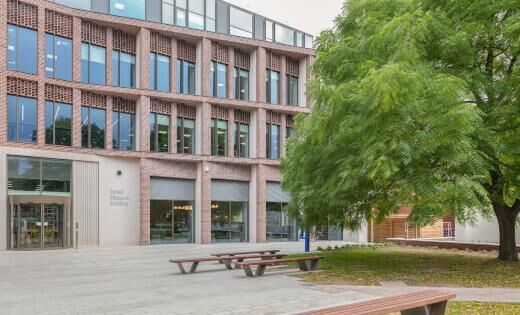Beyond The Optimising Agent - Summer School in Advanced Methods for Economics and Political Economy

- Date: Monday 24 June 2024, 9:00 – 17:00
- Location: Leeds University Business School, Leeds UK
- Interval: Every day
- Until: Friday 28 June 2024
- Type: Seminars and lectures
- Cost: Details provided below
This summer school provides training in advanced methods for Economics and Political Economy with practical applications.
It focusses on theoretical and empirical methods beyond constrained optimisation.
What will be covered?
The school covers both analytical foundations in the form of lectures as well as applications through hands-on computer-lab exercises and interactive group work. A variety of different methods are introduced, both quantitative and qualitative (see tentative programme below). Concrete applications illustrate how participants can apply these methods in their own research.
Who can participate?
The summer school is targeted at PhD students (or PGRs) and Early Career Researchers (up to 3 years since completion of PhD). In exceptional cases, we will also consider applications from postgraduate students.
Pre-requisites
There are no formal pre-requisites. However, note that the focus is on advanced methods, some of which will naturally build on more elementary methods we won’t have time to review.
This is an indicative list of methods or skills the school will build on:
- maths: familiarity with elementary algebra, functions, calculus (eg differentiation rules) and basics of linear algebra (vectors and matrices). These methods are covered, e.g., in chapters 2 – 7 of Alpha C. Chiang and Kevin Wainwright (2005) Fundamental Methods of Mathematical Economics
- coding: basic familiarity with Stata and R. A brief overview of the most elementary functions in R that will be used can be found here.
Successful applicants will receive a reading list and a set of optional exercises to prepare for the summer school in advance.
Accommodation and participation fees
- Participation fee with accommodation (for 6 nights from 23 to 29 June, Storm Jameson Court, University of Leeds Campus): GBP 200
- Participation fee without accommodation: GBP 100
- Lunch and coffee will be provided.
Tickets with accommodation include a private room in the accommodation at Storm Jameson Court, University of Leeds Campus (a few minutes walking distance from where the summer school will take place).
International travel scholarships and fee waivers
We encourage applications from scholars from low- and middle-income countries (see World Bank classification here) for whom we provide two international travel scholarships of up to 1,000 GBP each. In addition, we provide a limited number of fee waivers for participants without access to funding from their institution. Please indicate on the application form if you want to be considered for an international travel scholarship or a fee waiver.
Organising Team and Support
The summer school is jointly organised by the Department of Economics at the University of Leeds and the Institute of Political Economy, Governance, Finance and Accountability (PEGFA) at the University of Greenwich. We are grateful for financial support from the Young Scholar Initiative (YSI) at the Institute for New Economic Thinking (INET).
- Contact Email: beyondoptimization@gmail.com
- Coordinator Leeds: Karsten Kohler
- Coordinator Greenwich: Rafael Wildauer
How to apply
Deadlines
- Application deadline: 1 April 2024
- Acceptance notification: 3 April 2024
- Registration and payment: 30 April 2024
Programme
|
|
09:00 – 13:00 (Lecture + lab session) | 14:00 – 18:00 (Lecture + lab session) |
|---|---|---|
|
Mon 24 June |
(1) Structural Macroeconomic Models Rafael Wildauer (Greenwich) Causality in economic models, causal graphs, structural models of demand, distribution and conflict inflation, using software for numerical simulations. Software: R |
(2) Dynamic Models Karsten Kohler (Leeds) Systems of difference equations, eigenvalues and eigenvectors, stability vs instability, cycles, balanced growth, chaos. Software: R |
|
Tues 25 June |
(3) Stock-flow Consistent Modelling and its Ecological Applications Maria Nikolaidi (Greenwich)
Macroeconomic modelling, climate change, steady-state analysis, calibration. Software: R |
(4) Input-Output Analysis. An Overview of the Framework and Model Extensions Alessandra Celani (Paris, OECD) Technical coefficient matrices, multipliers, inter-country input-output tables, global value chain participation indicators, environmentally extended input–output models, structural decomposition analysis. Software: R |
|
Wed 26 June |
(5) Agent-based Models Luca Fierro (International Institute for Applied Systems Analysis) Foundational issues, model design and analysis, calibration/estimation, applications to financial markets, environment and macroeconomics. Software: R |
(6) Macroeconometrics Karsten Kohler (Leeds) & Rafael Wildauer (Greenwich) Modelling macroeconomic time series, auto-regressive distributed lag models, vector auto-regressive models, local projections, identification. Software: Stata |
|
Thurs 27 June |
(7) Panel Data Methods. Difference-in-Difference Estimation and Extensions Leila Gautham (Leeds) Two-way fixed effects, event studies, synthetic control methods, and shift-share research designs. Software: Stata |
(8) Case Studies and Causal Inference Jennifer Churchill (UWE Bristol) When to do case studies, what to hope for from case studies, systematising case study analysis: methods of process tracing and qualitative comparative analysis. Software: R |
|
Fri 28 June |
(9) Conducting Interviews in Economic Research Bianca Orsi (Leeds) Rationale for interviews in economic research; conduct and analysis of interviews (e.g. sampling, avoiding bias, coding, making sense of interview material). Software: Nvivo |
(10) Taking stock: Where Do We Go From Here?
|

